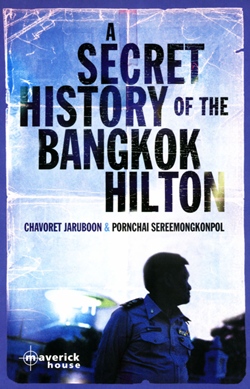The publishers Maverick House, though based in Ireland, have had a very fruitful cooperation with authors in Thailand. These have included the Pattaya Mail’s executive editor, Dan Dorothy (Mango Rains), Colin Martin (Welcome to Hell) and the Pattaya Mail’s special correspondent Dr. Iain Corness (Farang and Farang The Sequel).
This week’s review is of another Maverick House cooperation with Chavoret Jaruboon (The Last Executioner) and Pornchai Sereemongkonpol (Ladyboys) to produce A Secret History of the Bangkok Hilton (ISBN 978-1-905379-71-2, Maverick House, 2010).

The Bangkok Hilton is not part of the international Hilton hotel chain, but is the maximum security jail in Bangkok for criminals who have been sentenced to more than 30 years incarceration. Chavoret Jaruboon has a more than working knowledge of the jail, being the executioner there for many years before retiring. Pornchai Sereemongkonpol has helped Chavoret, with English not being a language prerequisite for an executioner.
It is an interesting book to read as it gives you an insight into the Thai attitudes towards jails, inmates and guards. Chavoret goes right back in the history of the Thai penal system to the 13th century, where the brutality is very similar to that employed in Europe in those days. He then follows this through till the building of the Bang Kwan prison and its use today.
He spends some time philosophizing as to the spiritual rights and wrongs of execution, and one is left feeling that for some crimes, perhaps there is no option. However, the method of execution has changed from beheading, to being cut down by sub-machine gun, to the lethal injection system used today.
The age-old query is put forward as to whether or not he may have executed innocent men. He sidesteps this very nicely, pointing out that it is the penal/legal system that institutes the death penalty, not the executioner.
And he does go into some detail of people who were wrongly accused and pronounced as guilty. Many of these came from over-zealous policing, with time lines for delivering a culprit being pronounced by politicians. The “war on drugs” of a few years ago rates a totally scathing mention. There is also the scenario of ‘influential figures’ skewing the justice system. He interviews a number of innocents who have ended up spending many years behind the bars of the Bangkok Hilton. Most are broken people, though one or two fought on to the end and received some small financial compensation from the very unwilling authorities.
Chavoret writes of the different ethnic groups in the jail, expressing the opinion that the farangs get a much easier life (relatively) than the other aliens such as the Burmese, Laotians and Cambodians.
At B. 485, it is an inexpensive read, and one that can perhaps open your eyes a little. The inmates are not all tarred with the same brush, with some very interesting ethnic differences, and the entire Thai legal system is shown to be as non-transparent as it is imagined by those outside looking on. Chavoret, of course, was on the inside looking out. You will not envy him.




